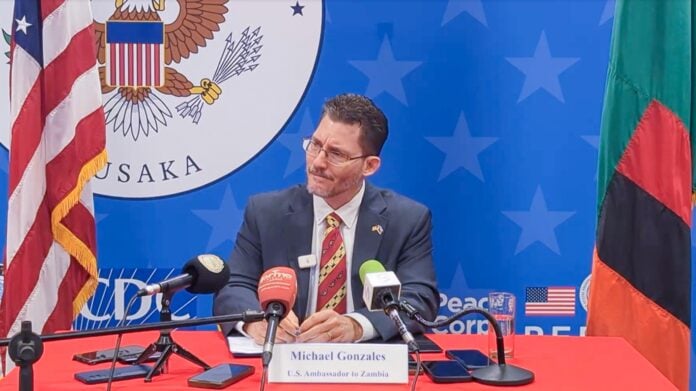United States Ambassador to Zambia Michael Gonzales expressed Washington’s readiness to support President Hakainde Hichilema’s vision of reform, describing the Head of State’s recent parliamentary address as forward-looking and anchored on accountability, transparency, and citizen-centered development. His remarks underscore the growing alignment between Lusaka and Washington as Zambia positions itself as a reform-oriented partner in Africa.
Speaking after the President’s address to the National Assembly, Ambassador Gonzales praised the government’s commitment to restoring economic stability, strengthening governance institutions, and investing in key sectors such as agriculture, mining, and energy. He said these priorities were consistent with American policy goals of promoting prosperity, democracy, and good governance on the continent. “The President’s speech was not only ambitious but also reflective of the resilience and aspirations of the Zambian people,” Gonzales said.
The envoy emphasized that US-Zambia cooperation will continue to be grounded in both trade and investment. He explained that while aid remains a tool of support, sustainable development will only be achieved through building strong markets, fostering entrepreneurship, and ensuring that resources are harnessed for the benefit of citizens. “Our focus is on partnerships that empower Zambians, farmers, miners, and entrepreneurs, not just governments,” he noted.
Ambassador Gonzales further highlighted transparency and accountability as the cornerstones of Zambia’s successful engagement with international partners. He stressed that sustained reforms in public finance management, anti-corruption measures, and the protection of democratic freedoms will determine the depth of support from global actors. “The United States is ready to walk this journey with Zambia,” he affirmed, “but it is the commitment to truth, openness, and accountability that will make these reforms irreversible.”
The endorsement by the US carries both symbolic and practical weight. Symbolically, it strengthens the Hichilema administration’s credibility as it navigates domestic political criticism that accuses it of being disconnected from ordinary citizens’ struggles. Practically, it signals potential opportunities for expanded trade, investment, and technical assistance at a time when Zambia is seeking to rebuild its economy after years of debt distress.
American firms have already shown interest in Zambia’s agriculture and renewable energy sectors, areas the government has flagged as strategic for growth and job creation. US support could bolster investments in irrigation, crop diversification, and clean energy projects, aligning with the government’s push to modernize agriculture and end power shortages. In mining, American stakeholders have also expressed interest in Zambia’s vast copper and cobalt reserves, particularly as global demand for clean energy technologies accelerates.
However, the ambassador’s remarks were not without caution. Gonzales underscored that while international support is available, the primary responsibility for driving reforms lies with Zambians themselves. He urged government, civil society, and the private sector to work collaboratively in ensuring that reforms yield tangible benefits. “Reforms must not only be about numbers in a report,” he warned, “they must translate into food on the table, jobs for youth, and reliable power for businesses.”
The timing of Gonzales’ message is significant, coming as the ruling United Party for National Development (UPND) faces growing political criticism ahead of the 2026 elections. Opposition parties, particularly the Patriotic Front (PF), have accused the government of focusing on pleasing international creditors while neglecting citizens’ hardships. By praising the President’s vision, the United States has offered the administration a diplomatic boost that reinforces its narrative of global confidence in Zambia’s leadership.
Analysts say the endorsement highlights Zambia’s shifting geopolitical significance. With global competition over Africa’s minerals and markets intensifying, Zambia’s reforms offer a chance to deepen its partnerships with the West while balancing ties with China, a major creditor and investor in the country. The US has in recent years sought to reassert influence in Africa by supporting governance and economic reforms, and Zambia has emerged as a key partner in that strategy.
For ordinary Zambians, the challenge remains ensuring that diplomatic statements translate into real improvements in daily life. While reforms in agriculture, mining, and energy offer hope, citizens continue to grapple with high living costs, unemployment, and power cuts. Ambassador Gonzales acknowledged these realities, stressing that partnerships must always prioritize citizens’ welfare.
As Zambia heads towards a pivotal election year, the government will likely tout such endorsements as proof that it is on the right track. The opposition, meanwhile, is expected to argue that international praise means little if households remain under economic strain. What is clear, however, is that the US commitment to President Hichilema’s vision strengthens the government’s hand on the international stage, reinforcing its legitimacy as it pursues reforms at home.


